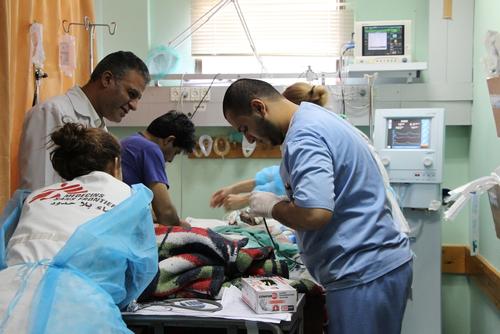“The wounded are arriving non-stop at Gaza’s Al Shifa hospital. They arrive in waves; how many exactly depends on the intensity of the bombing. Many of the wounded have multiple traumas, burns and shrapnel wounds. We are caring for them alongside teams from the Palestinian Ministry of Health. Of the patients at Al Shifa, I would say about 30 percent are women and 30 percent are children. But it is difficult to give precise figures and to keep regular records amidst the chaos. The priority for us is medical care.
The wounded arrive in waves
Last night in the emergency room, we received two little girls aged four and six, both in a serious condition. They are sisters who were near a place that was bombed in Jabaliya refugee camp. When they arrived, they had multiple wounds to the legs and face, fractures, and head and chest injuries. At their age, the chest isn’t completely formed, and the blast was so powerful that their lungs were badly damaged. They were in the operating theatre all night, and today we gave them post-operative care. Their injuries are so significant that I simply don’t know if they will survive.
Too many patients
One thing is certain: there are too many patients. We try to deal with the most urgent cases, to save the lives of the most seriously injured. Our teams are working non-stop. In Al-Shifa hospital, MSF has seven international staff – surgeons, anaesthetists and nurses – working in the emergency department, the operating theatre and the burns unit, alongside Palestinian staff. The Palestinian staff from the Ministry of Health are doing a great job: they are experienced in war surgery and in dealing with large influxes of wounded people. An MSF medic might stabilise an emergency patient who will be operated on by a Ministry of Health surgeon; or an injured person might be stabilised by our Palestinian colleagues before being operated on by one of our surgeons. We divide up what needs to be done in whichever way works best.



